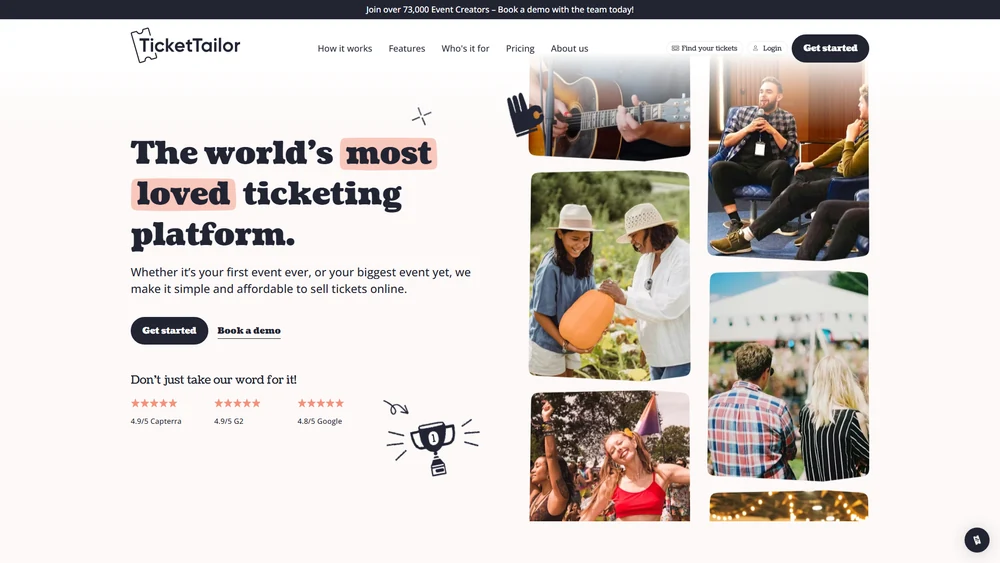Ticket Tailor Overview & 2026 Industry Position
Ticket Tailor is a commission-free ticketing platform used by events of all sizes—from grassroots festivals and fundraisers to major venue operators. As of 2026, the platform has solidified its position as a disruptor in event tech by offering flat-fee pricing, intuitive tools, carbon-neutral operations, and a relentless focus on putting event creators first. Ticket Tailor competes not by overwhelming users with features but by refining simplicity and owning affordability. In 2026, this strategy stands in sharp contrast to complexity-heavy incumbents that continue to rely on per-ticket fees and bloated platforms.
From Launch to 2026: Ticket Tailor’s Journey
Ticket Tailor launched in 2010, founded by entrepreneur Jonny White to make event ticketing easier and more affordable. Initially a bootstrap product focused on small community events, it quickly attracted users looking for a simpler alternative to Eventbrite. Over time, Ticket Tailor evolved into one of the few platforms that rejected per-ticket transaction fees—and this has become its hallmark.
- 2010: Ticket Tailor launches in London with an emphasis on affordability and simplicity.
- 2012: Introduces PayPal integration and embeddable widgets for websites.
- 2018: Goes carbon neutral, focusing on sustainability as a brand attribute.
- 2021: Launches donation-based ticketing and advanced analytics.
- 2023: Hits 30+ million tickets sold and enhances white-labeling options.
- 2025: Expands API and third-party integrations, reinforcing modular workflows for midsize organizations.
In 2026, Ticket Tailor’s core strategy is clear: stay fiercely affordable while optimizing workflows for lean event teams looking for reliability without bloat.

Ticket Tailor Key Features
Ticket Tailor’s feature set is designed to address 80% of use cases with 20% of the complexity. Here are the standout capabilities for 2026:
- Flat-fee ticketing: No per-ticket commissions. Pay monthly or annually.
- White-labeling: Customize your checkout to match brand identity.
- Embedded widgets: Sell tickets directly from your own website.
- Donation & free ticket support: Especially useful for nonprofits and community events.
- Timed entry and recurring events: Perfect for museums, tours, and wellness studios.
- Automated emails & attendee exports: Keep communications streamlined.
- Zapier, Stripe, and Mailchimp integrations: Automate key workflows easily.
Workflow & UX Experience
Ticket Tailor delivers a clean and minimal admin interface. Navigation is tabbed, logical, and uncluttered—even users running their first event can set up ticketing in under 10 minutes. Key experience highlights in 2026 include:
- Mobile-optimized box office for on-the-go ticket sales.
- Drag-and-drop layout for event builder.
- Analytics dashboards are visual and easily interpreted.
- Custom checkout flows that adapt across devices.
The UI strikes a strong balance between user-friendliness and power. Most users can go live without onboarding support.
Ticket Tailor Pricing Analysis & Value Metrics
As of July 2026, Ticket Tailor follows a flat monthly pricing model. No per-ticket fees unless using third-party payment processors. Here’s how pricing breaks down:
| Plan | Monthly Price | Annual Discount | Events & Support |
|---|---|---|---|
| Lite | $18/mo | $15/mo when billed annually | 1 event live at a time • Email support |
| Essentials | $45/mo | $39/mo annually | Unlimited events • Priority email support |
| Professional | $85/mo | $75/mo annually | Custom domains • White-labeling • Zapier |
Value Note: Compared to per-ticket models that extract 5–10% of event revenue, Ticket Tailor becomes significantly more economical as ticket volume increases.
Competitive Landscape
Ticket Tailor thrives by offering simplified pricing and focused functionality compared to big-box platforms. Here’s how it stacks up:
| Platform | Fees | Best For |
|---|---|---|
| Ticket Tailor | Flat monthly fee | Creators with high ticket volume |
| Eventbrite | 5.5% + $0.99 per ticket | Complex, multi-day events needing more plugins |
| Humanitix | Per sale % goes to charity | Mission-driven and large charity events |
| Oveit | Pay-as-you-go or monthly | Web3 and decentralized apps |
Ticket Tailor Use Cases in 2026
The platform is particularly popular among:
- Independent venues and theatres
- Music festivals—especially local/regional
- Fundraisers and nonprofit galas
- Workshops and professional education
- Fitness, wellness, and retreat organizers
Ticket Tailor Integrations & Extensions
Ticket Tailor supports a growing roster of integrations to tie events into broader platforms. As of 2026, key integrations include:
- Stripe and PayPal: Seamless payment collection
- Zapier: Automate tasks with over 5,000 apps
- Mailchimp: Sync attendees to email lists
- Google Analytics & Meta Pixel: Ad and campaign integration
Pro Tip: Take full advantage of white-label and embed options to manage audience experience from your own domain—no redirects or off-brand checkout flows.
Pros & Cons
- Pros:
- Extremely budget-friendly for high-volume events
- Easy to configure, even without tech know-how
- Transparent, flat-fee pricing
- Strong nonprofit features (free/donation tickets)
- Customizable checkout with full white-labeling
- Cons:
- No mobile event management app yet
- Feature set may be too lean for large-scale conferences
- Basic themes/options for ticket page design
Final Thoughts
Ticket Tailor is perfectly suited for event organizers prioritizing affordability, speed, and control. Especially in 2026, when price-consciousness is compounded by increasing software complexity, this lightweight approach shines. It may not cater to deep customization or enterprise-scale logistics, but for community-led, nonprofit, or local events, very little matches Ticket Tailor’s balance of price and usability.
Ticket Tailor FAQ
No. Ticket Tailor uses flat monthly pricing but does offer a free test mode for trial purposes.
No, there are no per-ticket commissions. You only pay the monthly or annual subscription fee.
Yes, you can embed the checkout directly onto any website or use a white-labeled ticket page.
As of 2026, no standalone mobile app exists, but the admin interface is responsive and works well on iOS and Android browsers.
Ticket Tailor integrates with Stripe and PayPal for payments, with full control over processing setup and fees.

